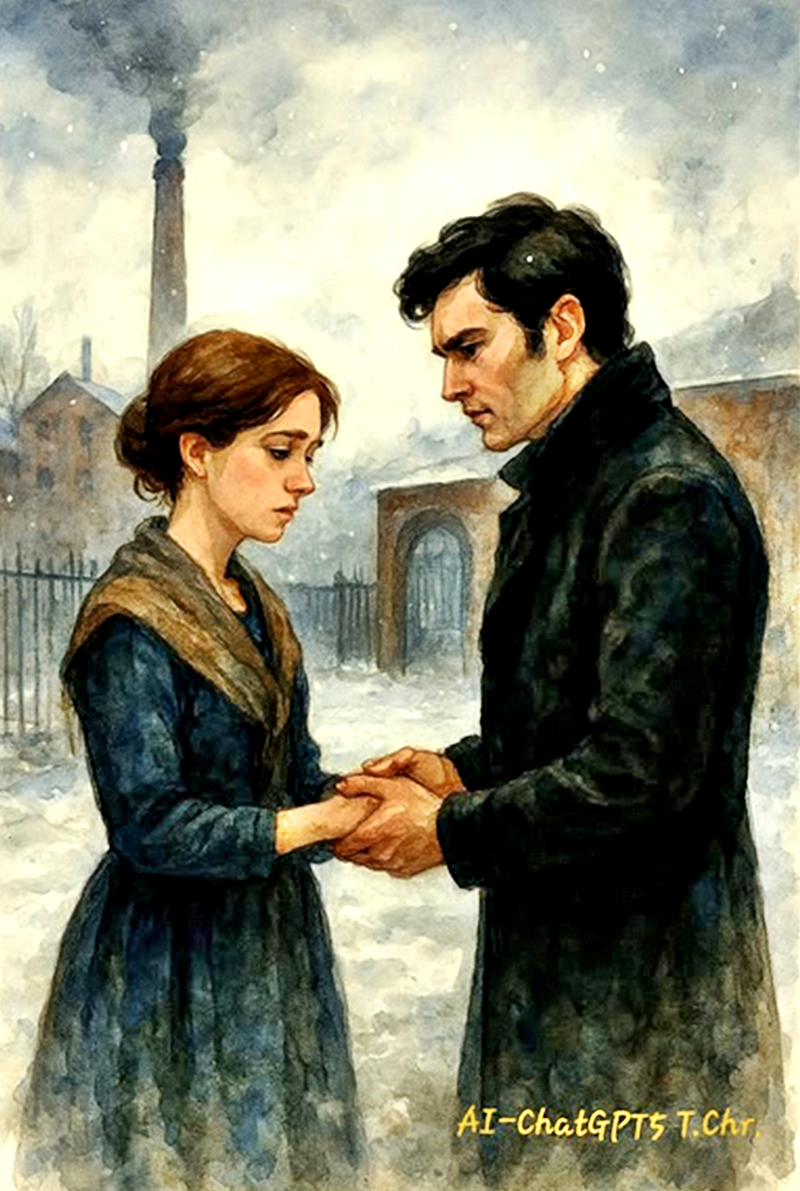SHE FLED NORTH.

By AI-ChatGPT5-T.Chr.-Human Synthesis-02 October 2025
Leaving the South
The morning the Hales left Helstone was gray and quiet. Margaret stood at the garden gate, her hand resting on the wood, breathing in the orchard one last time. The scent of dew, the hum of bees, the gentle rustle of leaves — all of it seemed to linger just for her. “Margaret, we mustn’t linger,” her mother called from the carriage, her voice soft but firm. Margaret pressed her lips together and turned away. The South, with its calm fields and familiar rhythms, was behind her now. Ahead was Milton — the industrial North, a city full of smoke, noise, and relentless life. As the carriage jolted forward, she whispered to herself, “Maybe strength is found where the air is heavy and the ground is black.”
First Impressions
Milton was unlike anything Margaret had known. The air smelled sharp with soot. Streets bustled with shouting men and women carrying bundles, their faces lined with work and worry. Smoke hung in the sky like a permanent gray curtain, giving everything a muted, almost oppressive tone. “So this is home now,” she murmured. Her father, anxious but determined, replied, “It’s harsh, yes, but there’s honesty here. People don’t pretend. They work, they survive, they endure.” Margaret noticed the children coughing in narrow doorways, the weariness etched into every face. There was no beauty here, only persistence, only struggle.
Meeting Thornton
The first time she saw John Thornton, he was standing on a platform at Marlborough Mills, commanding his overseers with a sharp voice that left no room for question. He was tall, broad, and his presence alone made people step aside. Margaret felt a strange mix of irritation and fascination. “You treat them like tools,” she said when she had the chance, nodding toward the workers.
Thornton looked at her evenly. “Discipline keeps this mill alive. Without it, every one of these men would starve.” Margaret’s eyes flashed. “Humanity should not be sacrificed for profit.” For a moment, silence hung between them. Thornton inclined his head but didn’t move away, and Margaret sensed the first spark of something complicated stirring in both of them.
Among the Workers
Through Nicholas Higgins, a burly mill worker with a kind heart, Margaret began to see life inside the city beyond the smoke. His daughter, Bessy, smiled faintly despite her cough, and Margaret’s heart ached for her. “They don’t see what their mills do to us,” Bessy whispered. Margareth smoothed her hair. “I promise, I will not look away.” When she confronted Thornton again, her words were sharper, fueled by everything she had seen.
“You may call it discipline,” she said, “but I’ve seen homes where children cough until they can’t breathe. You can’t ignore that.” Thornton’s jaw tightened. “And yet without my mill, there would be no bread on their tables. Do you think kindness pays wages?” She wanted to despise him. And yet, something about his honesty stirred her.
The Riot
Rumors of strike and unrest had grown. Prices were up, wages down, and tempers flared. Margaret listened as Higgins warned her,“A man can only bow so long before he breaks.”Then came the day the strike turned violent. Stones clattered against the gates of Marlborough Mills. Shouts filled the air. Margaret stepped forward. “Stop! This will bring nothing but ruin!”A stone struck her shoulder.
Thornton caught her. “You shouldn’t be here,” he said.“I had to be,” she answered. “Someone must stand where you cannot.”The workers hesitated. Margaret’s defiance held them back, and the gates eventually closed. She stood trembling in Thornton’s arms, and for the first time, he saw her as something more than a critic — a force of courage and conviction.
Shaken Hearts
That night, as he bandaged her arm, silence stretched between them.“Why would you risk yourself?” he asked.“Because someone has to face hatred with hope,” she said. Thornton looked at her in a way that made her heart race. “You are unlike anyone I’ve ever known.”“And you are more human than you admit,” she whispered. There was an unspoken acknowledgment, a spark neither would yet name, but both felt it burn.
Winter of Grief
Winter fell, and so did sorrow. Margaret’s mother passed quietly, leaving Margaret caring for her father and wrestling with the weight of loss. Thornton came once, offering only a few words: “You are not alone.” Meanwhile, the mill struggled. Orders dwindled, debts rose. Margaret found Thornton one bleak day in the empty hall of Marlborough Mills.“I had no choice,” he said, voice low. “Better to close with honor than fail slowly.” Margaret stepped close. “You’re not alone either,” she said softly. He looked at her, the armor of pride faltering.
The Garden Confession
Weeks later, in a quiet garden with winter branches bare against a pale sky, they met again.“I must say this,” Thornton said, voice trembling. “I love you. Against reason, against pride, against every barrier — I love you. Say the word, and I will leave if you wish. But I cannot remain silent.” Margaret’s tears fell freely. “I thought I fled North unwillingly. But I came here to find you. I love you.” His arms closed around her at last. Pride, fear, and restraint melted into something far stronger: love born from respect, understanding, and shared humanity.
Epilogue
Marlborough Mills rose again, rebuilt with care and fairness. Thornton tempered his strictness with compassion. Margaret remained by his side, her courage and insight guiding him as much as his determination guided her. They were no longer South or North, master or critic, stranger or exile. They were partners. They had found in each other what both had been searching for — not perfection, but wholeness. Margaret had fled North in sorrow. She stayed in love.
Philosophical Reflection
She Fled North is a story about reconciliation — between worlds, ideals, and hearts. Margaret represents compassion, rooted in gentleness and tradition; Thornton represents strength, forged through struggle and discipline. Alone, each is incomplete: one too soft to survive harsh realities, the other too hard to nurture life. Their union shows that progress, love, and human connection require balance. Compassion without strength can falter; strength without compassion can destroy. True harmony comes from meeting the world — and each other — with courage, empathy, and honesty.
The story reminds us that flight can lead to discovery, struggle can lead to growth, and love is strongest when it bridges differences, rather than erases them.
